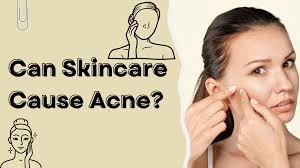Can skincare cause acne
Can Skincare Cause Acne? – Here is a Explanation
Skincare is designed to protect, nourish, and improve the skin, but surprisingly, certain skincare practices and products can actually cause acne. This paradox often confuses people who invest time and money in their skincare routines only to see more breakouts. The truth is that not all products are suitable for all skin types, and some habits may unintentionally lead to clogged pores and irritation. Let’s explore how skincare can contribute to acne and how to avoid it.
1. Wrong Products for Your Skin Type
One of the most common causes of skincare-related acne is using the wrong products for your skin type. For example, people with oily or acne-prone skin should avoid heavy creams, thick oils, or products with comedogenic (pore-clogging) ingredients. These can block pores and trap sebum (oil), bacteria, and dead skin cells, leading to breakouts.
To prevent this, choose products labeled “non-comedogenic”, which are specifically formulated not to clog pores. Always read ingredient lists and patch-test new products before using them on your entire face.
2. Overuse of Active Ingredients
Skincare often includes active ingredients like retinol, salicylic acid, benzoyl peroxide, and glycolic acid—all beneficial in moderation. However, using too many of these at once or too frequently can disrupt the skin’s protective barrier. This can lead to dryness, inflammation, and irritation, which may worsen acne rather than help it.
Introduce active ingredients slowly and one at a time. Give your skin time to adjust before adding another active. Always use a gentle moisturizer to protect your skin barrier, especially when using strong treatments.
3. Product Layering Issues
Layering skincare products incorrectly can also cause problems. For instance, applying heavy creams before lightweight serums can prevent the serums from penetrating the skin. In other cases, combining certain ingredients (like vitamin C and retinol) without proper spacing or guidance can cause irritation, leading to acne-like flare-ups.
Follow the general rule: apply products from thinnest to thickest texture and allow each layer to absorb before applying the next. When in doubt, keep your routine simple.
4. Inadequate Cleansing
Cleansing is one of the most important steps in any skincare routine. If makeup, sunscreen, or excess oil is not properly removed, it can mix with skincare products and clog pores. This is especially common when people skip cleansing at night or use harsh products that strip the skin, causing it to overproduce oil.
Use a gentle cleanser twice a day and double cleanse at night if you wear makeup or sunscreen. Avoid over-cleansing, which can damage the skin barrier and trigger more breakouts.
5. Dirty Tools and Fingers
Using unwashed hands or dirty applicators can introduce bacteria to your face, leading to breakouts. This includes makeup brushes, sponges, facial rollers, and even pillowcases.
Always apply skincare with clean hands and regularly wash your tools. Avoid touching your face throughout the day to minimize bacterial transfer.
Conclusion
While skincare is meant to help your skin, it can cause acne if the wrong products are used, applied incorrectly, or layered poorly. Other common issues include overuse of actives, inadequate cleansing, and poor hygiene. By understanding your skin type, keeping your routine simple, and using clean practices, you can avoid breakouts and enjoy clear, healthy skin.

Related Blog
What Causes Oily Skin and Can It Be Managed Naturally? Exploring Root Causes and Gentle Solutions
Aug 2, 2025 by Admin
General
What Are the Signs That You Have Sensitive Skin? Key Symptoms to Help You Identify This Delicate Skin Type
Aug 1, 2025 by Admin
General